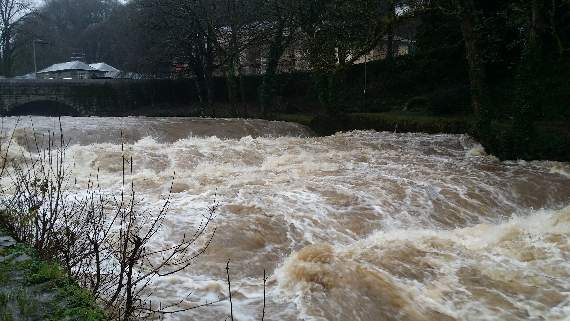FOLLOWING the bad weather in West Devon over the last few days, the Times has put together some advice for dealing with floods ahead of more predicted rainfall in the coming days — these guidelines are taken from the Environment Agency.
Preparing for a flood:
• Move items of personal value such as photo albums, family films and treasured mementos to a safe place.
• Think about who you could ask for help, or who you could offer help to in the instance of a flood, such as vulnerable neighbours or relatives.
• Think about what you would want to move to safety during a flood. Pets, cars, furniture, electrical equipment and other possessions.
• Check your insurance cover. Check your buildings and contents insurance policy and confirm you are covered for flooding. Have the contact details of your insurance provider so you can contact them if needed.
• Know how to turn off your gas, electricity and water mains supplies.
• Prepare a flood kit of essential items and keep it handy. This could include copies of your home insurance documents, a torch with spare batteries, a wind up or battery radio, a first aid kit, warm waterproof clothing and blanked, first aid kit, prescription medicines, bottled water and non-perishable foods.
Types of flood warning:
• There are three types of flood warning — flood alert, flood warning and severe flood warning. Flood alert is the least severe but warns people to be prepared for potential flooding. Flood warning means that flooding is expected and immediate action is required. Severe flood warning means that flooding could cause danger to life and will be bad. You can get up-to-date information on flood warnings by visiting the Environment Agency website.
Temporary flood protection equipment:
• Flood protection equipment can help stop flood water getting into your property. Follow manufacturer instructions to put these in place when you get a flood warning.
• Such equipment includes floodboards to fix around windows and doors, and sandbags.
During a flood:
• Focus on the safety of you and your family. Co-operate with the emergency services should they tell you to evacuate. Be prepared to act quickly and get to safety.
• Gather essential items together upstairs or in a high place. Move pets and family to safety or upstairs.
• Turn off gas, electricity and water supplies when flood water is about to enter your home if safe to do so. DO NOT touch sources of electricity when standing in flood water.
• Listen to local radio for updates.
• Call the Floodline service on 0345 988 1188 for updates on the situation.
• Check with vulnerable neighbours or relatives.
• Flood water can rise quickly. Call 999 if you are in immediate danger.
• On the roads, avoid driving or walking through deep water. Two feet of flowing water can move a car.
• If you touch flood water with your hands, make sure to wash them as soon as possible.
• Take care as there may be hidden dangers in flood water like sharp objects, raised manhole covers and pollution.
After a flood:
• In almost all cases the insurance company will send a loss adjuster to look at your property. They will confirm what repairs and replacements are needed and covered by your policy.
• If you rent your property, contact your landlord and your contents insurance company as soon as possible.
• If you do not have insurance, your local council should be able to provide information on hardship grants or charities that may be able to help you.
• When cleaning up, wear waterproof gloves, wellington boots and a face mask as flood water can contain sewage, chemicals and animal waste.
• You can get water out of your property using a pump and generator. Position the generator outside in the open as they produce carbon monoxide, which can kill.
Important numbers:
• National Flood Forum — 01299 403055
• Floodline — 0345 988 1188
• Environment Agency — 03708 506506
These guidelines have been set out by the Environment Agency.




